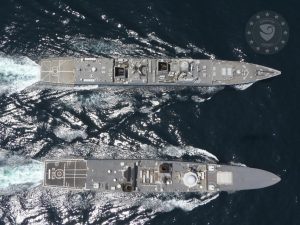On September 7, Italian Navy destroyer Caio Duilio and Indian Navy destroyer Surat conducted a passage exercise in the Indian Ocean. The Caio Duilio is currently participating in the European Union’s Naval Operation Aspides, which supports freedom of navigation by protecting merchant vessels and enhancing maritime situational awareness from the Red Sea through the northwestern Indian Ocean.
This passage exercise – which included maneuvering and tactical drills, radio and data exchanges, and simultaneous flight operations – specifically was an opportunity to enhance India-EU operational interoperability, reinforce India-EU professional naval ties, and demonstrate India and the EU’s shared commitment to maritime security.
A couple of days ago, the Spanish frigate Navarra also hosted the Indian First Training Squadron in the Seychelles.
In early June, the Indian Navy participated in a major naval exercise with the EU’s Naval Operation Atalanta in the Indian Ocean, focused on improving interoperability and advancing counterpiracy tactics through the simulation of a piracy attack on a merchant vessel. Italian ship Antonio Marceglia, Spanish frigate Reina Sofia, Indian frigate Trikand, and an Indian maritime patrol aircraft participated in the exercise.
Although the Indian Ocean is particularly important to India, EU-India naval cooperation is not confined to there: joint exercises have been conducted in the Gulf of Guinea and the Gulf of Aden.
In addition to the increasing frequency and complexity of naval cooperation, India and the EU are growing closer politically. The EU’s Political and Security Committee (PSC) – led by PSC Chair Delphine Pronk – visited India for the first time in September. The PSC oversees the EU’s Common Foreign and Security Policy and the Common Security and Defense Policy Members of the 30-person PSC delegation – which included PSC ambassadors of EU member states, officials from the European Commission, and officials from the European External Action Service – met with Foreign Secretary Vikram Misri, Deputy National Security Adviser Pavan Kapoor and other senior Indian officials. Topics for discussion included counterterrorism, cybersecurity, hybrid threats, space, defense industrial cooperation, disinformation and maritime domain awareness.
In an interview, Pronk stated, “We have had a very firm and committed strategy to the Indo Pacific because all these theaters are extremely interconnected. Our latest military naval operation, Operation Aspides, is also doing just that to secure the safe passage of consumer ships that are going from one part of the world to another part of the world.”
India and the EU have a chance to cooperate more on defense industrial matters, including through EU purchases of Indian arms. To make that a reality, however, the EU would need to streamline the Permanent Structured Cooperation (PESCO) – a legal framework to plan, develop, and invest in shared capability projects – to make cooperation with India easier. The EU would also need to be willing to relax legal and human rights obligations for India (or India would need to show willingness to meet the EU’s requirements).
India could signal the importance it places on EU-India security cooperation by appointing a defense attaché in Brussels and sending its foreign minister to the fourth ministerial Indo-Pacific dialogue in Brussels this fall. More long-term goals include signing an EU-India Security of Information Agreement and EU-India Security and Defense Partnership. The EU currently has security and defense partnerships with both Japan and South Korea in the Indo-Pacific.
India has traditionally pursued a nonaligned foreign policy with a historic tilt toward Russia. In a different context, Indian Prime Minister Narendra Modi’s presence alongside Russian President Vladimir Putin and Chinese President Xi Jinping at the Shanghai Cooperation Organization (SCO) summit would have provoked European outrage. However, the style and substance of U.S. foreign and trade policy is pushing New Delhi to reassess its diplomatic strategy and Brussels to “pragmatically” overlook this development. The EU and India are hoping to organize a summit meeting as early as possible in 2026.
Another sign of increasing EU-India cooperation are their ongoing trade talks. Negotiators are hoping to sign a free trade pact by the end of 2025. Those negotiations are continuing as the United States is trying to pressure New Delhi to stop purchasing Russian crude oil by raising tariffs on imports from India to 50 percent. The Trump administration has called on G-7 and EU leaders to do the same.

































